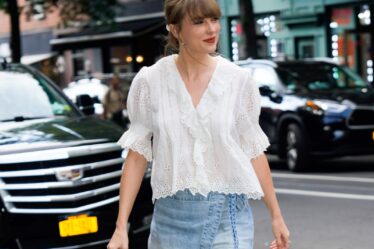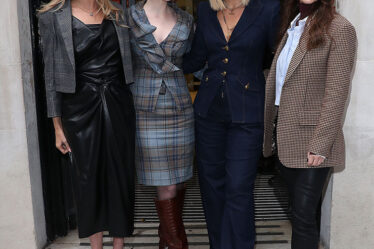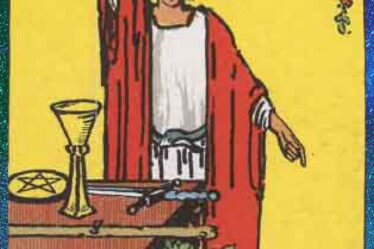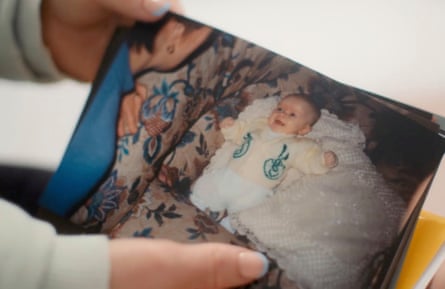
As a child, Ellie Simmonds would fantasise about what her birth mother might be like. In her wildest visions, maybe her birth mother was a rock star, or famous, or extraordinary in some other way. “You never think as a seven-, eight-year-old, that you’re actually going to meet your birth mum,” she says. It turns out that the woman knew exactly who the baby she had given up was – and that the child was the famous and extraordinary one. When Simmonds, then just 13, competed at the 2008 Beijing Paralympics, and won two gold medals for swimming, her birth mother put the pieces together: her name, her age, the details of her life that were becoming public. In February this year, they met for the first time.
Simmonds has made a powerful and very moving documentary – I sobbed throughout – about tracing her birth family, which also highlights the shocking difficulties faced by disabled children waiting to be adopted. Thankfully, this wasn’t the case for Simmonds, who has achondroplasia, or dwarfism – she was adopted within months of being born – but it remains the reality for many other children.
She began the process just over a year ago; the time felt right. Her retirement in 2021 after the Tokyo Paralympics – a career that saw her win five Paralympic gold medals and countless world titles, and break several records – had given her the time and space to think about life beyond swimming. But the end of her career as an athlete when she was still in her 20s (she is now 28) had also shaken her identity. If she wasn’t a swimmer and champion Paralympian, she thought, then who was she? It was a question that became even harder to answer when so much of her own life was a mystery to her.
Where did her warmth and chattiness, or her beautiful blue eyes – all strikingly radiant characteristics when we meet in a rather dull office – come from? Her love of animals, especially horses? Her competitiveness and determination? Mostly: what was going on for her birth mother that meant she decided, when her daughter was just two days old, to place her for adoption?
Simmonds misses swimming, or at least elite competition. “Lately, it’s getting to me more,” she admits. “This past year, I’ve definitely been aware more of, like …” She pauses. As a Paralympian, she says, “I was aware of different disabilities, and I was using my body as an engine. I was very confident in myself because I was good at something.” Since retiring, “my self-confidence has probably dropped. Lately, being aware of people staring at me in the streets is affecting me more. I don’t know why.”
She has been busy, deliberately so – her first year of retirement included embarking on this huge process of discovering her birth family, as well as competing on Strictly Come Dancing. “I’m keeping myself busy so I don’t have to think about things, because naturally I’m an overthinker.” Swimming used to soak those thoughts up. “Like: ‘What happens if I don’t enter the water like this? What happens if I don’t get a good night’s sleep?’ Questions, questions, questions. Whereas now those questions are diverted into other things.”
Is that when she started thinking about her birth family more? “I’ve always thought about them, growing up. I have photos of her when she had me, and with my birth sister.” Until fairly recently, however, Simmonds hadn’t given much thought to attempting to trace them. She had just turned 12 when she went to her first world championships in 2006, she points out. “So I never had the time, or the mental capacity. The amount of pressure that gets put on your shoulders when you’re an athlete – looking for my birth parents would have been an added pressure, an added emotional factor. I wasn’t ready to have those feelings as well.” Although her adoption was never a secret from her wider family, friends and, later, her boyfriend Matt, everyone agreed to keep it from the public to protect her.
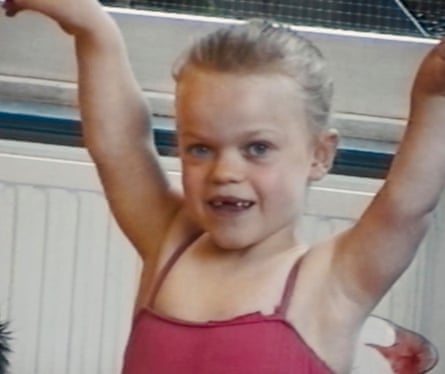
Simmonds was adopted by Val and Steve Simmonds, from Aldridge in the West Midlands, when she was three months old, and became the youngest of five. In many ways, it was a fairytale outcome. Her family had a swimming pool at the bottom of the garden, and soon Simmonds was swimming at a local club. When she was 11, she and her mother moved to Swansea so Simmonds could train with Team GB, coming back home at weekends. “My parents supported me, not just the swimming but all the opportunities. I didn’t like sitting around; I liked to be doing something all the time, and my parents helped me be that person. I loved summer, because it meant that I could stay out longer. We were very active, outdoorsy.”
Several of her siblings have disabilities. “We’re a family of embracing differences,” she says. “My parents brought us up in a very positive manner, very accepting of who we are and the positives of it. We’re very close.” The children were all adopted (sadly, Simmonds’s eldest sister, Georgina, died in 2013 at the age of 45), and Val and Steve had fostered dozens of children over the years, so adoption and fostering never felt unusual within the family. Simmonds says that, growing up, she was never aware of any feelings of rejection caused by her adoption. “I’m surprised,” she says, “but no. There were no moments that I was upset or angry. I’d been very, in a way, blase about it. Intrigued, but that’s me in general. I always like to ask loads of questions.”
Her parents filled her with love. “Hugely – love, family, support throughout.” The strange feeling, she says, is that “looking back, I could have had another life. I could have been someone so different, someone else. If I didn’t have my parents, I wouldn’t be the swimmer or the person that I am today. They gave me that opportunity and they put me on that journey.”
Simmonds had those few photos of her birth family and she knew some of her story – that she had been fostered for a while before her adoption. Until she started the documentary, however, she had no idea that her adoption records even existed, let alone that she could access them. The film tells how her birth mother was given a “fact sheet” about children with achondroplasia and what little could be expected of their lives. It essentially said they were “stupid”, and that they had traditionally found work in – I’m not making this up – the circus. This was the 1990s, not the 1900s. How did it feel to read that?
“It made me want to change people, help educate people that actually, being a disabled person is amazing.” It was almost too extreme and laughably wrong to be considered anything other than ridiculous, she says. “I think when I looked at it, I wasn’t angry. I was just like: ‘Gosh, this is really, really bad.’”
It changed the course of her life, and her birth mother’s. “When you’ve just had a baby, you’re vulnerable, you’re emotional, there’s a lot you’re feeling,” says Simmonds. “To find out the child’s got a disability, and then to be given this information … You are fearful. It’s that unknown. Even now, a child with a disability, you’re told they’re expensive, they need more support. But there are so many amazing things that come with a child with a disability, and I think we need to talk about it more. It’s life-changing, and it’s life-changing for the better.”
Simmonds has only empathy for her birth mother, even after discovering that she originally wished she’d had an abortion, or that Simmonds had died at birth. “I put myself in her shoes,” says Simmonds. “From the records, she was going through a lot mentally – I know more now – and she was on her own.” She had already split from Simmonds’s birth father. “Yes, I was upset, but I was also open to it. I think I had to read it a couple of times. It’s like I couldn’t compute that that was about me. Yes, it’s about me, but actually it doesn’t feel like it’s about me.” I find her empathy extraordinary and moving, even if in the documentary she also admits it might be the first time she has ever felt a sense of rejection as a result of her adoption. “From what I remember,” she says now, “it felt more like emptiness.”
In her film, Simmonds finds out about what it’s like for disabled children, even today, seeking adoptive families. Visiting social services, she is told that only one in 150 prospective families would feel particularly open to adopting a physically disabled child. “That definitely was emotional,” she says. “It’s eye-opening – still people are scared and fearful of bringing a child with a disability into their family. Yes, we’re a bit different, we sometimes need some extra support, but we’re just humans. Everyone deserves a home and a family that loves them.” She hopes to do more TV – she is a natural – partly to increase representation. “If kids see different types of people then, growing up, there won’t be that staring, there won’t be that stigma.”
When Simmonds’s adoption support worker got in touch, her mother expressed a wish to be in contact. That was a great relief – heartbreakingly, other disabled adoptees told Simmonds their birth parents had said no. Her mother asked to take it slowly, which suited Simmonds; her time on Strictly also provided a welcome joyous distraction. The pair were initially in touch by letter. Writing to her, says Simmonds, “made me really emotional. Going through this whole journey, I cried so much.”
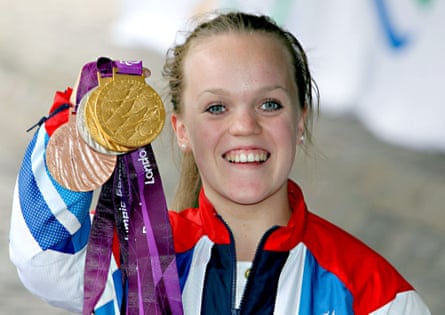
Did the fact Simmonds was famous add a strange element to it? It was a bit of a concern, she says, “because I didn’t want her to just get to know me because of it. I didn’t want her to view me like that – I wanted her to see me as a person.” She later discovered that her birth mother had worked out who she was more than a decade earlier, and had followed her career. “In a way, I felt like she was protecting me, because she could have easily come and seen me compete at any point. But she didn’t because she wanted me to get on with my life. She let me get in contact with her.”
The first time they were due to meet, Simmonds cancelled because of a migraine – something she often suffers from in times of stress. The second time, she says, “I was very, very nervous. Then as soon as she walked through the door, all those nerves just disappeared, and we just hugged and cried.” Initially, Simmonds planned to meet her mother for 15 minutes; they ended up talking for five hours. “She’s like me. We’re similar – she’s super-chatty and makes you feel at ease, and laughs all the time.” She beams and says again, more to herself: “She’s like me.”
Her mother knew Simmonds was making a documentary, but their meeting was not filmed and Simmonds has kept her identity secret. “I don’t want criticism or any bad things to happen to her, because she’s not in the wrong,” she says. Simmonds says her birth mother expressed regret and guilt, but was overwhelmingly relieved that her daughter has led the life she has. Was there any part of Simmonds that was angry, or sad, that she had been placed for adoption? “No,” she says. “I love my parents. If I hadn’t had the life with them, I wouldn’t be who I am.” They have been incredibly supportive, she says, although she is also having therapy to help her process things.
The pair’s relationship is still at an early stage and Simmonds hasn’t yet met her birth sister, or father (he and her birth mother are not really in touch). “At the moment, it’s still that slow process, trying to take it all in. It’s hard to describe what our relationship is like, but it’s like I’ve got another person included into me, which is really nice.”
Her identity is still building, a work in progress for a girl born 28 years ago, given the name Eleanor by a woman who made an agonising decision, and who grew up with a world-conquering spirit. “I think that work, life, and me as a person, I still need to figure out.”

